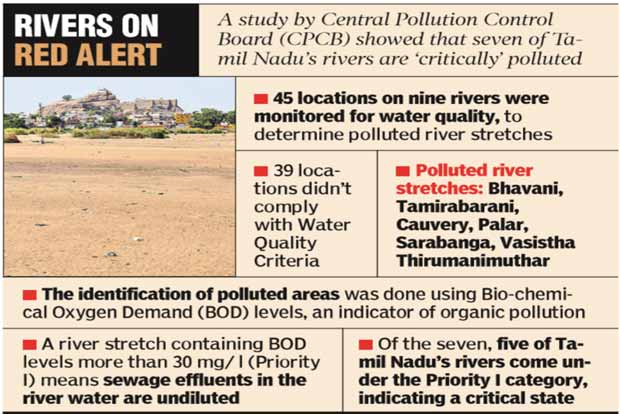Begin typing your search...
Seven TN rivers heavily polluted: Study
Seven of Tamil Nadu’s river stretches were found to be polluted in a recent study conducted by the Central Pollution Control Board (CPCB).

Chennai
CPCB, which monitors 445 rivers in 29 States and six Union Territories, zeroed down on 302 polluted river stretches on 275 rivers, based on Bio-chemical Oxygen Demand (BOD) levels, a key indicator of organic pollution. In Tamil Nadu, 39 locations along seven rivers — Bhavani, Tamirabarani, Cauvery, Palar, Sarabanga, Thirumanimuthar and Vasistha — were identified as polluted. Five of these river stretches were critically polluted with BOD levels above 30 mg/ l.
Mannargudi S Ranganathan, general secretary, Tamil Nadu Cauvery Delta Farmers’ Welfare Association, attributed the cause to be skewed industrial development. “In Salem and Mettur, hundreds of chemical industries release toxic effluents into the river. In the Palar belt, there are many tanneries and textile and dyeing factories flourish near rivers in Erode and Tirupur. Despite the government setting treatment plants, a majority of the industries are not operating them for fear of extra financial commitment.
In Mannargudi belt, where there is coal-bed-methane exploration, precious water is used to clean the lignite and dangerous effluents are released into the river. If this continues, agriculture in this belt will severely suffer” he said. Tamirabarani too has a similar tale of woe to narrate. Environmental activist Gunaseelan revealed, “This is the only river which originates and drains in Tamil Nadu. The factories release their untreated effluents and sewage too is dumped into the river. Moreover, rampant sand mining is also posing a serious threat.”
In 2015, farmers, politicians and the public protested against the setting up of beverages manufacturing plant at Gangaikondan, which would draw 15 lakh litres of water from Tamirabarani. Arun Krishnamurthy, an environmental conservationist, pointed out that other water sources such as lakes and ponds are also polluted. “We need a logical and scientific way forward, put away our urban emotions like encroachment,” he said.
Visit news.dtnext.in to explore our interactive epaper!
Download the DT Next app for more exciting features!
Click here for iOS
Click here for Android
Next Story



